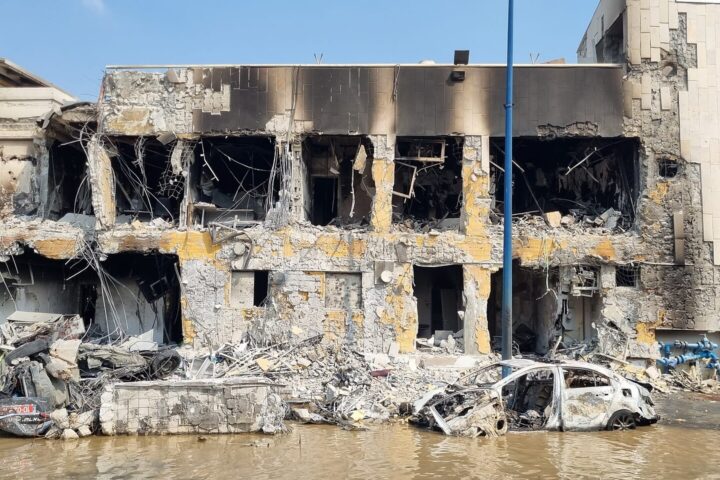.
By Mikhail Gorbachev, Vladislav Inozemtsev, and Alexander Lebedev
Confrontation between Russia and “the West” has been a central feature of global politics for decades, if not centuries.
The most recent completed chapter of that conflict, which ended symbolically with the fall of the Berlin Wall on November 9, 1989, was the costliest and most dangerous international showdown in history. Thirty years on, however, initial hopes of reconciliation have given way to mutual antagonism, leaving Russia increasingly isolated from the West.
Some Western leaders want to change this. In the run-up to the G7 summit in Biarritz in August, French President Emmanuel Macron and his American counterpart, Donald Trump, both announced their intention to bring Russia back into the club of the world’s leading advanced economies (though Macron emphasized that Russia’s readmission would depend on developments in Ukraine).
Several other G7 leaders strongly opposed the idea, and the Kremlin expressed little interest in it, either. Nonetheless, after Macron met Russian President Vladimir Putin in mid-August at Fort Brégançon (the summer retreat of French presidents), he insisted that Russia is “deeply European.” And following the G7 summit, the French president said that it would be “a profound strategic error” for Europe to isolate Russia further. So, what should be done to encourage reconciliation?
To be sure, Russia has often ignited confrontation with the West. It was Czar Nicholas I who in 1853 demanded that Russia become a “protector” of Turkey’s Orthodox populations and sent troops to occupy Moldavia and Wallachia. In the twentieth century, Lenin and Trotsky threatened the West with world revolution, and after World War II, Stalin imposed communist regimes in Eastern Europe and tried to incite a civil war in Greece. More recently, in 2014, Russia violated international law by invading Ukraine and annexing Crimea – the first forcible redrawing of national borders in Europe since 1945.
At the same time, however, Russians recall that war has repeatedly arrived in their country from the West, the most obvious examples being the battle with Napoleon in 1812, the Crimean conflict of 1853-1855, and the two world wars. Furthermore, the West regarded the peaceful conclusion of the Cold War – a result that was possible only because of the bold initiatives taken by the Soviet Union – as a profound geopolitical victory, and treated the new Russia like a defeated enemy.
The West has twice – in 1954 and the early 2000s – rejected the idea of integrating Russia into Euro-Atlantic structures, using much the same arguments on each occasion. And while accusing Russia of violating international law in Ukraine and elsewhere, the Western powers have themselves transgressed it openly and ruthlessly, notably in Kosovo in 1999, Iraq in 2003, and Libya in 2011.
Neither Russia nor the West have benefited from their conflicts. In 1855, Russian spending on the Crimean War was twice as high as its budget revenues for that year. The Soviet Union dedicated 13-17% of its GDP to the military. And in 2014, the Russian government allocated some 37% of the federal budget (or almost 8% of GDP) to the army, police, and other security agencies.
During periods of reconciliation with the West, on the other hand, Russia experienced internal liberalization. This pattern extends from the Great Reforms of Alexander II to the “thaw” of the late 1950s following the death and denunciation of Stalin, to the era of glasnost and perestroika in the 1980s. In addition, the end of the Cold War between the West and the Soviet Union was the principal reason for both Europe’s subsequent political integration and global economic integration.
Time for a New Approach
Today, there is no fundamental reason for Russia to collide with the West, or for the West to count Russia as an existential enemy. Instead, both sides need a radical new approach to addressing their existing quarrels – just they did when the Soviet Union’s leadership proposed its “new thinking” in international politics in the late 1980s.
We fully support Macron’s view that Russia should be treated as a European country. But for years, we have heard nice words about engaging Russia that fell short of establishing either the “common European home” that the Soviet Union proposed in the 1980s, or the Europe “from the Atlantic to the Urals” that another French leader, Charles de Gaulle, envisaged in the late 1950s.
The world needs a general framework for integrating Russia into the West – but a West more like the one that Russia left in 1917 than the West of 2014. This should offer Russia’s leadership a new approach that fits Russia’s sense of its historical role, its current sovereign status, and its aspirations for a better future.
Today, the West has no alternative but to engage with Russia, for three main reasons. Economically, Russia and the Atlantic region complement each other: Russia trades its natural resources for high-tech goods, while providing a big consumer market that can greatly benefit Western firms. Socially, Russia is the most Europeanized country outside the Western “core,” and thus might become a crucial resource for an aging Europe, particularly if Russia’s demographics were to improve with a renewed rise in living standards. And geopolitically, Russia increasingly allies itself with China, much to the West’s consternation. Whether Russia ultimately sides with the West or the East will determine the global balance of power for decades to come.
A new reconciliation between Russia and the West should seek to “repair” the Eurocentric world of a hundred years ago. During the twentieth century, Europe lost its dominant position in global politics as a result of its internal wars, and fell into the shadows of its “offshoots” – America and Russia.
Historically, these two wings of European civilization expanded to the East and West until they encountered each other at the shores of the Russian River in what is now northern California. In fact, the West-East division seems meaningless: someone traveling east from Moscow will eventually pass through southern Alaska, Quebec, the United Kingdom, and Denmark. Go west from San Francisco, on the other hand, and you will end up in Vladivostok.
To remake a world free of conflicts between Russia, Europe, and America, today’s leaders should therefore forget the East-West division and look instead toward what one of us (Inozemtsev) calls the Northern Alliance.
In this context, Macron should be praised for another outstanding initiative, namely the establishment of the Paris Peace Forum to commemorate the centenary of the end of World War I. There is no better place to debate the contours of a new global order that would repair the damage inflicted on the Eurocentric world by the events not so much of the last five years as by those over the course of the last century.
Reconciliation between Russia and the West is badly needed, and not only because it would make both parties more prosperous and the world more peaceful. Closer ties also would help to address the great challenges and human suffering in those “in-between” countries – including Ukraine, Moldova, and Georgia – that are tragically divided between the West and Russia. There is no chance of resolving their problems within the existing framework of global political competition.
These countries will enjoy a peaceful and prosperous future only if they become parts of the global North rather than arenas of continuous struggle between the West and Russia. That, in turn, depends on the boldness of leaders in Europe, Russia, and America. Let us hope, then, that they do a better job than their predecessors did after the two world wars.
Mikhail Gorbachev was the last head of state of the Soviet Union and was awarded the Nobel Peace Prize in 1990. Vladislav Inozemtsev is Founder and Director of the Center for Post-Industrial Studies in Moscow and a member of the Russian International Affairs Council. Alexander Lebedev, an investor and philanthropist, is the principal backer of The Independent and Evening Standard newspapers in the UK
© Project Syndicate, 2019.
www.project-syndicate.org







